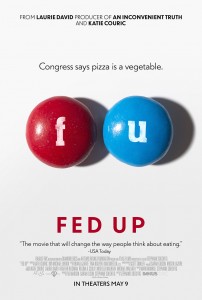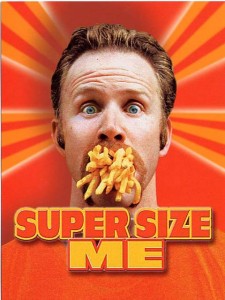Oscar-winning producer Laurie David is back with an even more inconvenient truth: our food is killing us and the government is powerless to stop food companies from making it worse. I spoke to David and director Stephanie Soechtig about the film.
I want to start with the end — to me the most interesting part of the movie was what I call the Citizens United problem,orporate involvement in making policy decisions about health and nutrition and disclosure. One of the most devastating revelations of the film was the story about the way the industry softened findings of a World Health Organization report on the impact of sugar on health.
SS: What’s interesting about the WHO report was just how hard it was to actually find that story. Peter Jennings, who appears in a clip, was the only American newscaster who covered that. I found it initially, in a paper from the UK, and I contacted the head of the World Health Organization at the time and asked him more of the story but I couldn’t find anything in the press on this other than that one Peter Jennings clip. We really had to dig hard to unearth that and it really didn’t get any mainstream press attention in the US. And the headline in the UK paper was “George Bush is beholden to sugar barons and he is jeopardizing the future of American children.” It was an incredibly damning letter the WHO had sent to Tommy Thompson at the time. I’m a journalist by trade and had I seen that, it would have been my lead story. It was a really damning letter and it got no coverage. So it was just interesting to see just how the media was a bit complacent in what happened as well.

And what do you think is the reason for that? Do you think it’s because of their advertisers? Do you think that they sensed that there isn’t an interest in this as an issue?
SS: Yeah, a hundred percent. Look at the recent effort of the voluntary guideline to stop marketing to kids. Some of the people that were up there lobbying against it were some of the major networks and you saw Viacom and Nickelodeon and all of them up there because they are reliant on the advertising dollars. So everyone has a dog in this fight it seems.
LD: No one cares about the health of the American public.
Another area where that came up was the lack of transparency around sugar on labeling of food. What went into the decision not to have a percentage displayed?
LD: I think that the industry has been fighting that from day one. I don’t think that anybody even tries to do it anymore. It’s all part of the conventional labeling, completely accepted. That’s got to be some serious under the table stuff that’s gone on to keep that off the label. But you know what’s funny about it? What the truthful daily recommended amount of sugar that you need per day is? It is zero, zero! You can imagine how damning that number would be for all these products!
That chart that you show about the amount of sugar in our food is really shocking. Every morning I take calcium vitamins and because of the movie I looked at the sugar content and I was shocked! As soon as I’m done with this jar I am going to try to find some calcium that doesn’t have sugar in it.
SS: Exactly! And that is the whole point of the movie. We want to level the playing field for people. It’s heartbreaking that families think they are doing the right thing, think they are making the healthier choice and what they are eating is making them sick. It’s not right! And just look at yogurt as a great example right now. Yogurt is marketed to death as a healthy choice for breakfast and if you look at the sugar content of most of these fruit filled yogurts, honestly it’s a dessert.
The other thing that surprised me was about the takeover of full lunchrooms by fast food companies. Is that based on lobbying at the local level or is that a purely economic decision — where did that come from?
SS: We met with a principal and she was just as distraught as anyone that her student body was able to buy diet soda and candy bars for breakfast. And she felt that her hands were tied as well too. She said, “There’s nothing I can do about it.” And I think everyone just feels a little hogtied about the policies. What is missing is a common sense approach. We all know that tomato paste isn’t a vegetable and that french fries aren’t vegetables. And I think that we were all really shocked when we saw the footage that these kids were sending us back that they had slushy machines and McDonalds in their cafeteria.
How did you find the kids that struggling with obesity and their and the families?
SS: We spent a little over a half a year just calling schools, churches, synagogues, different hospitals, doctors that specialized in diabetes and obesity and we’d say, “We’re looking for some families that could give us sort of a look into their world. What was making it so hard to make good food choices?” And it was incredibly difficult to find people. It was incredibly labor-intensive. But it’s incredibly courageous of the families. You saw how candid they were with. It all just kind of fell into place I think the way it was supposed to because we found these incredible families who really opened our eyes to things that we had no idea were happening.
And yet they didn’t really make much progress.
SS: We weren’t making a reality show. This wasn’t “The Biggest Loser.” We didn’t send trainers to them. This was asking them to show us what was happening in their lives. They were our field reporters on the ground showing us life on the front lines. So how could they make progress? What they showed us is how much misinformation is out there. And the answers to what is happening is this film. So I think the real story now is to see what happens once they’ve seen the film, what progress they make then.
LD: You saw the end of the movie that Tina and Brady started cooking real food and they changed their lifestyle. Tina has lost 100 pounds. Of course, Brady has had a tougher time. It’s the entire food carnival environment we are living in. So Brady went on to get a job at Bojangles and his school asked him to sell candy bars to raise money. Te second he left his house, this is what he is dealing with so it is not a big surprise he gained the weight back.
SS: I don’t know why are so shocked that his school asked him to sell candy bars. I mean, there are Girl Scouts selling cookies right on every corner. It’s crazy.
And the ads for these foods are always saying, “You deserve this,” or “This is going to help you get your energy back.”
LD: “Open happiness.”
SS: And happiness is used as a marketing tool for everything! I mean it’s really outrageous, it’s outrageous!
What kind of research material are you developing for people to have to follow up and learn more?
SS: We have a great website. We have some school curriculum on there already and a discussion guide. And one of the goals of the movie to get our 60 minute version of it into every school in the country. We made the movie with kids in mind, we want kids to see movie and be empowered by it. Another thing we are doing and it’s never been done before, we have dubbed a Spanish language version of the movie which is going to be released on May 16th in certain markets. So I think we’re doing as much as we can and we are hoping that the single most important thing is for people to come out to the theaters and see this film.
And I have to say, the things I think we put out are so powerful. I mean, look at our poster. I think the poster really breaks through the haze of media stuff out there. I think it is iconic. It was one of the most popular Instagrams the week it came out. We have an incredibly powerful trailer which kids are posting on their Facebook page and helping us get the word out so I think that we’ve got lots of ambassadors and social media support so I hope we are getting the word out.
LD: I think the film really unfolds like a murder mystery thriller. It is not a dry educational documentary. It really plays like a film more than a typical documentary.





